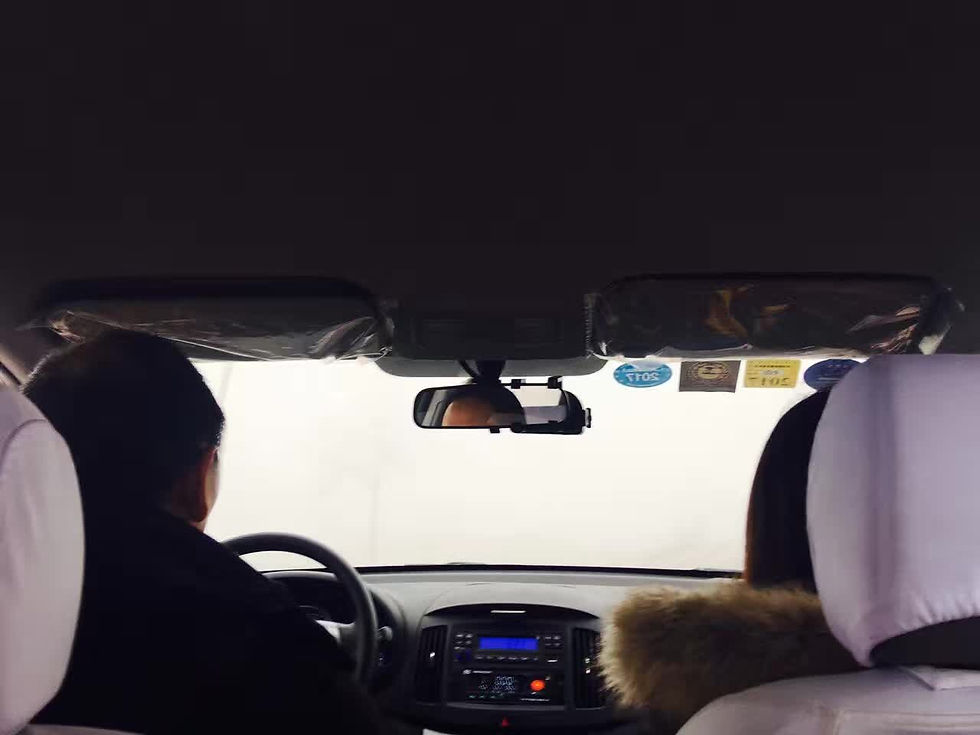Air pollution and the “Tragedy of the Commons”
- Yuxin Shen
- Jan 17, 2017
- 3 min read
One of the biggest sustainability challenges I’m concerning is the air pollution in China. Since I came from Beijing, the capital of China, I’ve experienced air pollution many times, and see how it’s impacting health of the next generation — new born babies — and people’s living standard in general.

People driving “blindly” on the road to go to work and school. Poor visibility can hardly see the car in front.
<Photos taken by myself on Dec 25th, 2016 (Beijing, China)>
During this winter break I went back to China, and visited some friends and family members. For a few days, because the air pollution was so serious, people literately drove blindly on the road to go to work and school. The visibility was so poor that people could hardly see anything in front of the car. Also, it’s as dangerous as you can imagine to drive on the road and make a right turn without clearly seeing other cars driving to this direction. The AQI value is almost 1000 (even though the highest number is 500). I wore a mask and walked on the road, my eyes and nose were sensitive to the pollution and kept secrete mucus to protect themselves. My nephew is 5 years old, and during those polluted days, he got serious fever and kept coughing. When I went to hospital with him, I saw the emergency treatment room was full of children like him.
What I kept hearing from those anxious mom was that: Why the government doesn’t do something to this air pollution?
But, is this something can be changed by Chinese government? If the problem is to fix a bad maintenance freeway or abate tax, the government probably have the control on the situation. How does air pollution different from other problems? One of the answers might be that air is a common good, which doesn’t belong to or owned by any organization. In 1968, an article was published on the Science journal by Garrett Hardin called “The Tragedy of the Commons”, in this journal he talks about how rational people destroy a common good to maximize personal profit. Thus, some problems can not be solved by “technical solution, it requires a fundamental extension in morality”. And he mentions pollution as one of the reappearances of the tragedy, because when people realize that discharging the pollutants is cheaper than treating them, they will put those pollutants into the environment, which is a common good.
The solution of air pollution is still up in the air. In the last century, Los Angeles and London both experienced serious air pollution while the country was developing. But the other big problem China currently facing is population growth, which also mentioned in Hardin’s journal, just like air pollution, population growth doesn’t have a technical solution as well. The nature has a great ability to heal itself, which also mentioned by Hardin as “Flowing water purifies itself every 10 miles”. But the population growth and morality decline makes the pollution exceed the nature’s ability to heal itself.
One technical solution might work is to lower the cost of pollution treatment, but behind this, population growth in China and people’s morality will affect the result more than technical solution. The public transportation in China is very developed, however, most of people want to live like the first world country— Driving on their own car instead of relying on shuttles, buses, and subways. I remember when I took a ecosystem class, my professor mentioned that “People from the second world and third world want what we (first world people) have”. The problem for Chinese people to get a car is they have a 1.4 billion population out there, comparing to 325 million people in the United States. If there’s 1.4 billion cars driving on the road, technical solution can never help to solve air pollution problem. But still, people want what the first world people have, and they don’t need to pay for polluting the air. Because air is a common good.
Hardin gives an example of “mutual coercion” in his article, which mentions that in order to prevent people robbing bank, people have to know that bank is not a “common good”. Therefore, people’s morality will be changed. However, air is a flowing thing and doesn’t bounded by any restriction. It’s hard to force people make a mutual coercion on “air is not a common good”. Adding tax to vehicles and oils might reduce the demand of cars. The mutual coercion needs to be made here might be: Air is something we need to save for the next generation to grow healthily. Therefore, the tax on vehicles would favor the children.
Bibliography:
Hardin, Garrett. “The Tragedy of the Commons.” Science 162.3859 (1968): 1243. Web.
http://science.sciencemag.org/content/162/3859/1243.full















Comments